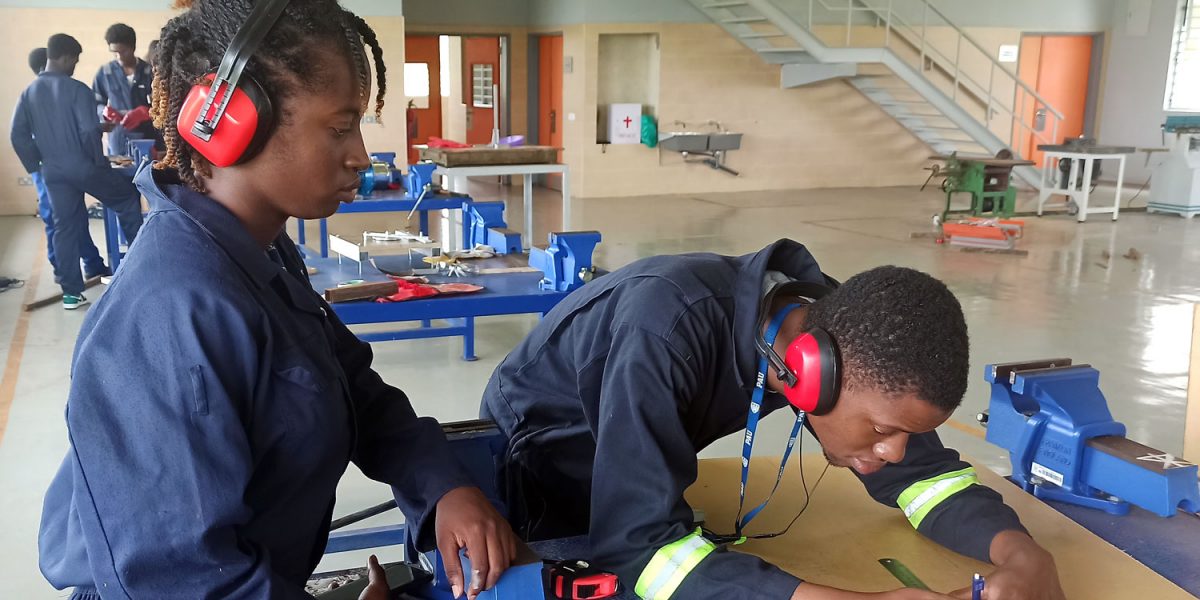B.Eng in Electrical/Electronic Engineering
The B.Eng programme in Electrical/Electronic Engineering is informed by the aspiration to train electrical/electronic engineering professionals in the areas of design, building and maintenance of electrical control systems, machinery and equipment, etc., with the highest level of professional and ethical responsibility.
The programme will prepare students for careers in the vast areas where electrical engineering is applied such as in transport networks, lighting, heating, ventilation and air-conditioning (HVAC) systems, power generation and distribution, renewable energy, telecommunication, manufacturing and construction industries, etc. With the skills students will acquire in this programme, they will be better equipped to improve individual and corporate performance, with the resultant impact on national productivity and economic growth.
Philosophy
The general philosophy of the Electrical/Electronic Engineering programme is to produce graduates with high academic standard and adequate practical background for self- employment as well as being of immediate value to industry and the community in general. The Degree programme in Electrical/Electronic Engineering of the Pan-Atlantic University is intended to provide a solid foundation in the principles and practices of engineering for young people who look forward to a career in engineering. It is also a preparation for those young people interested in an academic career and entrepreneurship in the area of engineering. Emphasis will be given to the knowledge of problem solving approaches, critical thinking about, and in-depth analysis of, engineering issues and problems, and the acquisition of a capacity for ethical and competent professional performance.
Furthermore the programme is informed by the aspiration to train electrical/electronic engineering professionals in the areas of design, building and maintenance of electrical control systems, electric power, electronic devices, power electronics, microcomputers, digital electronics, electrical machines, instrumentation, communication networks, etc., and who would uphold the highest intellectual, ethical and professional values that promote creativity, social responsibility, and the spirit of enterprise. The programme will prepare students for careers in the vast areas where electrical/electronic engineering is applied such as in telecommunications, power generation and distribution, renewable energy, manufacturing, aviation/aerospace, automotive, information technology, lighting, heating, ventilation and air-conditioning (HVAC) systems, military hardware, utilities, consultancy, general maintenance and construction industries, etc. With the skills students will acquire in this programme, they will be better equipped to contribute to improving national productivity and economic growth in general while earning a decent living. Electrical/Electronic Engineering is a dynamic, fascinating and rapidly growing area that has become an integral part of the world that we live in today. It occupies a central position in our daily life, both in homes and in the workplace. The need for individuals with good electrical/electronic engineering skills and competencies will continue to grow.
Objectives
The fundamental aim of the Electrical/Electronic Engineering programme is tied to that of the University through the School of Science and Technology. It is to form competent and socially responsible engineering professionals who are committed to the promotion of the common good of society and the advancement of the engineering profession. The programme further aims to produce engineering manpower with the adequate knowledge and skills to handle engineering situations/problems competently and ethically. To achieve this, the programme will prepare the graduates:
- To design engineering projects and supervise their implementation.
- To design and make components, machines, equipment and systems.
- To design and develop new products and production techniques in industries.
- To install and maintain complex engineering systems so that they can perform optimally in our environment.
- To adapt and adopt exogenous technology in order to solve local engineering problems.
- To be able to exercise original thought, have good professional judgment and be able to take responsibility for the direction of important tasks.
- To develop appropriate leadership, interpersonal, organizational and entrepreneurial skills.
- To improve on indigenous technology to enhance local problems solving capability.
- To be conversant with all the materials, components, machines, equipment, production techniques and systems in Electrical/Electronic Engineering.
- To man and maintain the specific production equipment in Electrical/Electronic Engineering.
- To plan, manage and be responsible for quality control of the products and processes in the plant/factory.
- To be able to manage people, funds, materials and equipment.
Admission (UTME) Requirements
The following are the admission requirements for the five (5) year bachelor’s programme in electrical/electronic engineering
- At least 5 credit passes in SSCE or equivalent (including English, Mathematics, Physics, Chemistry and any other science subject) in not more than 2 sittings. In addition, courses like Further Mathematics and Technical Drawing will be an added advantage
- Score the minimum approved JAMB cut-off for the programe
- The required UTME subjects are: Mathematics, English and Physics, with one additional subject from either Chemistry, Biology or a core science subject.
- Pass PAU post-UTME screening




